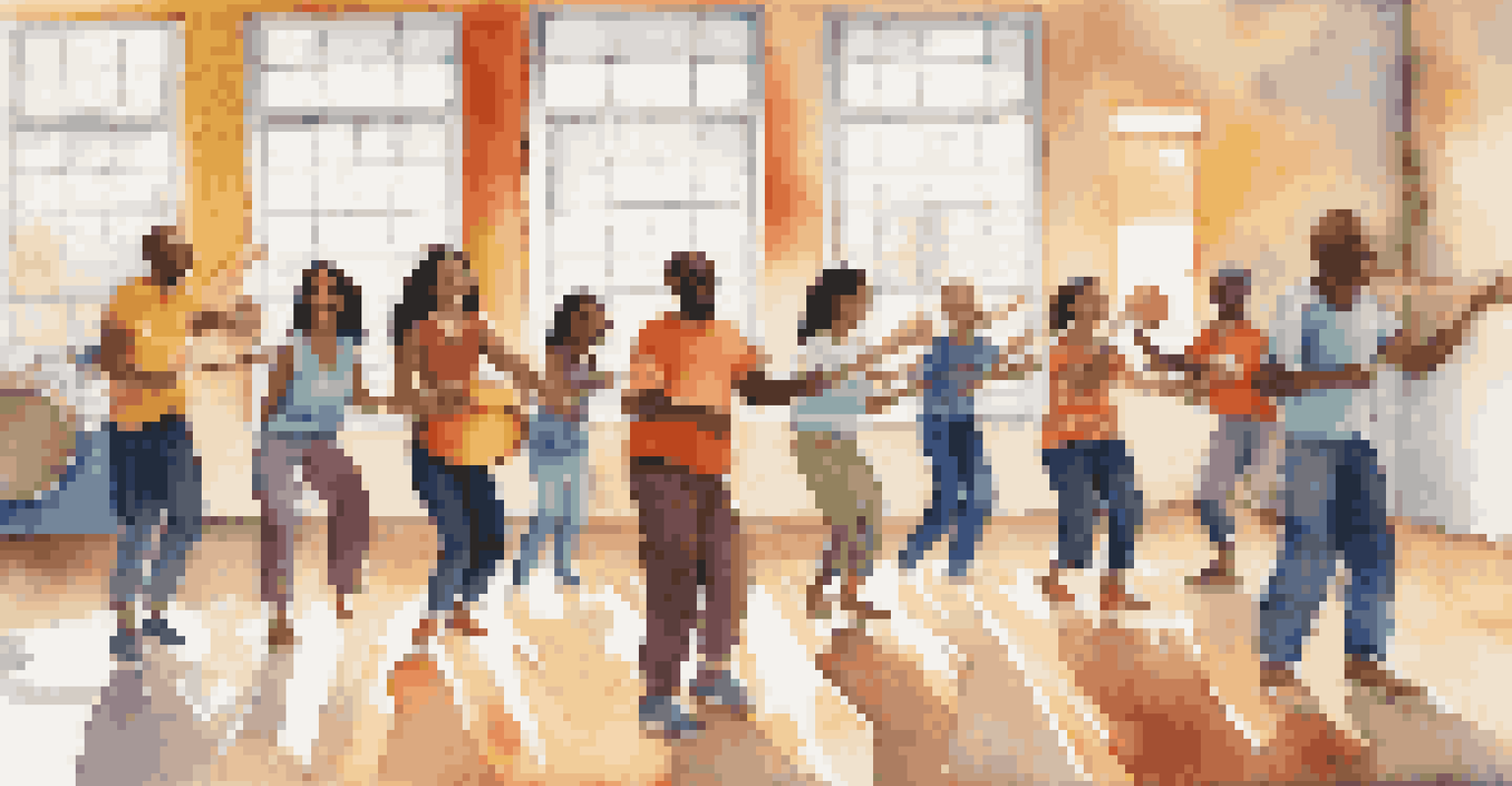Music Therapy Techniques for Enhancing Communication Skills

Understanding Music Therapy and Its Benefits
Music therapy is a therapeutic approach that uses music to address various needs, including communication skills. By engaging with music, individuals can express themselves in ways that traditional methods may not allow. This creative outlet can be especially beneficial for those who struggle with verbal communication.
Music can change the world because it can change people.
Incorporating music into therapy sessions can foster an environment of comfort and openness. The rhythm and melody often create a sense of joy and relaxation, which can help reduce anxiety. As a result, clients may feel more inclined to communicate and share their thoughts or feelings.
Furthermore, studies have shown that music therapy can enhance brain function related to language and communication. The interplay of listening, singing, and playing instruments stimulates different areas of the brain, promoting improved verbal and non-verbal communication skills.
Using Songwriting to Foster Expression
Songwriting is a powerful tool in music therapy that encourages individuals to articulate their thoughts and feelings. By creating lyrics, clients can explore their emotions and experiences in a structured format. This process can lead to greater self-awareness and confidence in their communication abilities.

Moreover, songwriting allows for a personal connection to the music, making it more meaningful. As clients craft their songs, they are not just expressing themselves—they are also sharing a part of their identity. This sense of ownership can be incredibly empowering, leading to improved verbal skills.
Music Therapy Boosts Communication
Music therapy utilizes creative techniques to enhance verbal and non-verbal communication skills.
In sessions, therapists often guide clients through the songwriting process, helping them to brainstorm ideas and refine their lyrics. This collaborative effort not only strengthens the therapeutic bond but also enhances the client's ability to articulate their thoughts clearly.
Incorporating Rhythm and Movement Activities
Rhythm and movement activities in music therapy can significantly enhance communication skills. Engaging in drumming or clapping exercises helps individuals connect with the rhythm of language. This connection can improve timing and pacing, which are crucial elements of effective communication.
Where words fail, music speaks.
Additionally, group rhythm activities foster social interaction and collaboration among participants. When clients participate in ensemble drumming, they must listen and respond to each other, honing their social communication skills. This shared experience can also lead to increased confidence in their ability to communicate verbally.
Ultimately, rhythmic activities promote a sense of belonging and teamwork, which are essential for developing strong communication skills. Clients learn to express themselves not only through words but also through the universal language of rhythm.
Engaging in Vocal Exercises for Clarity
Vocal exercises are a key component of music therapy aimed at enhancing communication. These exercises help clients develop their vocal range, articulation, and projection. By practicing different sounds and pitches, individuals can become more aware of their speaking voice and how it impacts their communication.
In addition to improving vocal quality, these exercises can also build confidence. As clients gain mastery over their voices, they often feel more at ease when speaking. This newfound confidence can translate into more effective communication in everyday situations.
Songwriting Encourages Self-Expression
Through songwriting, clients can articulate their emotions and experiences, fostering greater self-awareness.
Therapists often incorporate fun and playful vocal activities, such as singing games or tongue twisters. These engaging methods not only make the process enjoyable but also encourage clients to experiment with their voice in a supportive environment.
Utilizing Music Listening Activities for Comprehension
Listening to music is a crucial aspect of music therapy that can enhance comprehension skills. By analyzing lyrics and melodies, clients learn to interpret meaning and emotional nuances, which are vital for effective communication. This practice encourages critical thinking and active listening, both of which are essential components of understanding others.
During therapy sessions, therapists may select specific songs that resonate with clients' experiences. Discussing these songs can lead to deeper conversations about feelings and thoughts, thereby enhancing verbal expression. This connection between music and personal experiences can make communication feel more relevant and impactful.
Moreover, music listening activities can create a shared experience that fosters connection between clients and therapists. This bonding over music can help build trust and open lines of communication, making it easier for clients to share their thoughts and feelings.
Creating a Safe Space for Expression
A cornerstone of effective music therapy is creating a safe and supportive environment. This safe space encourages clients to express themselves without fear of judgment. When individuals feel comfortable, they are more likely to communicate openly, leading to more productive sessions.
Therapists play a crucial role in establishing this environment by being empathetic and responsive to clients' needs. This supportive approach fosters trust, allowing clients to explore their feelings through music and communication. As a result, they may become more willing to take risks in expressing themselves.
Creating a Safe Space is Key
Establishing a supportive environment allows clients to express themselves freely, enhancing their communication skills.
In such a nurturing space, clients can experiment with different ways of communicating, whether through song, rhythm, or spoken word. This freedom to explore enhances their overall communication skills, empowering them to express themselves in various contexts.
Evaluating Progress and Celebrating Achievements
Monitoring progress in music therapy is essential for recognizing improvements in communication skills. Therapists often use specific goals to assess clients' growth, whether it's increased vocabulary, improved articulation, or enhanced listening skills. Regular evaluations help tailor the therapy to meet clients' evolving needs.
Celebrating achievements, no matter how small, is equally important in the therapeutic process. Acknowledging progress boosts clients' motivation and reinforces their commitment to improving communication. This positive reinforcement can create a cycle of success that encourages continued growth.

Incorporating celebration into therapy sessions can take various forms, such as sharing songs created or reflecting on improvements made. This not only highlights the value of their efforts but also fosters a sense of accomplishment and pride in their communication journey.
Music Therapy: A Pathway to Enhanced Communication
In summary, music therapy offers a unique and effective approach to enhancing communication skills. Through a variety of techniques such as songwriting, rhythm activities, and vocal exercises, clients can develop their ability to express themselves more clearly and confidently. The creative nature of music therapy fosters a supportive environment that encourages open communication.
As clients engage in these activities, they not only improve their verbal skills but also gain essential social and emotional competencies. This holistic approach ensures that communication enhancement is not just about words, but also about understanding and connecting with others.
Ultimately, music therapy serves as a valuable tool for anyone seeking to enhance their communication skills. Whether it’s through individual or group sessions, the transformative power of music can lead to meaningful improvements in how we connect with the world around us.